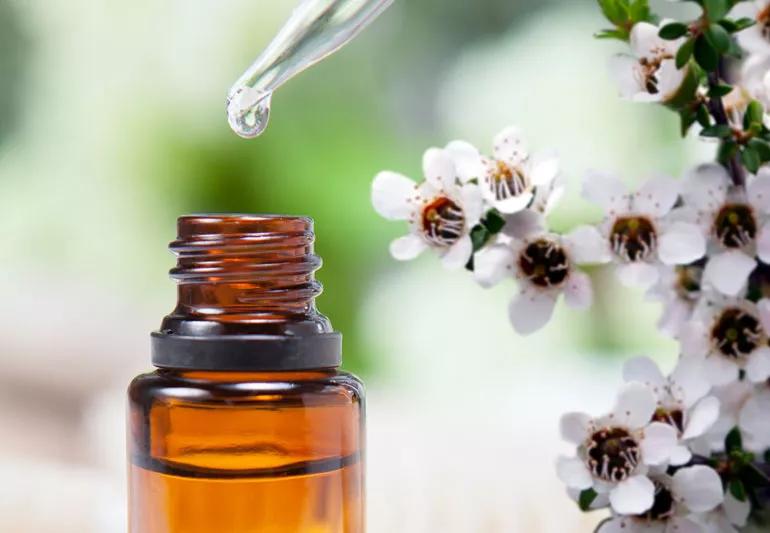It isn’t risk free and shouldn’t replace the aftercare recommended by your piercer

Image content: This image is available to view online.
View image online (https://assets.clevelandclinic.org/transform/ff7ee7ea-416a-489e-a44a-cc8092bda0e4/tea-Tree-Flowers-oil-164560100-770x533-1_jpg)
Close up of tea tree essential oil with tea tree blossoms in the foreground.
Tea tree oil (also known as melaleuca oil) is an essential oil that — in its diluted form — is used topically to treat a wide range of skin issues, from acne and athlete’s foot to dandruff and insect bites.
Advertisement
Cleveland Clinic is a non-profit academic medical center. Advertising on our site helps support our mission. We do not endorse non-Cleveland Clinic products or services. Policy
Tea tree oil is a great natural alternative to synthetic anti-inflammatories. And it has antiseptic properties to boot! But should you really be putting it on a fresh piercing? We asked family physician Simon Hodes, MB ChB.
Some people turn to tea tree oil for wound care because of its natural antimicrobial and anti-inflammatory properties, but it can also dry out and irritate skin, especially if the tea tree oil isn’t properly diluted.
“Tea tree oil may well have a place in your piercing aftercare, but that’s a question of personal preference,” Dr. Hodes says. “I think it’s something I’d be very cautious about recommending medically because if you’ve got irritated or sensitive skin, you need to be very careful.”
Dr. Hodes is clear that you should always follow the aftercare instructions you get from your piercer. If you want to use tea tree oil, you should be doing so in addition to anything they recommend, not as a substitution for it.
While he doesn’t recommend it, Dr. Hodes notes that tea tree oil is generally safe to use on most piercings, with two big exceptions. First, tea tree oil is toxic when ingested, so you should avoid using it on any oral piercings. Second, genital piercings are particularly sensitive. They should only be treated as indicated by the piercer.
Advertisement
The way you prepare tea tree oil for piercing aftercare has a lot to do with how you plan on using it: As an added ingredient in your existing aftercare routine or another separate step. No matter how you’re using it, remember that tea tree oil always needs to be diluted before applying it to your skin.
If you’re looking for a quick way to cleanse your piercing in-between sea salt soaks, you can apply it using a cotton round, cloth or paper towel. You can either:
Most piercers recommend twice daily sea salt soaks. If you’re not looking to add an extra step to your aftercare routine, you can add a drop or two of tea tree oil to your regular soak (be it a DIY or store-bought solution).
It’s important to keep the following in mind if considering tea tree oil for piercing aftercare:
Tea tree oil is a natural anti-inflammatory and has been found to have antiseptic properties. For that reason, some people like to use diluted tea tree oil as part of their post-piercing aftercare. While generally safe to use on most kinds of piercings (excluding piercings of the mouth and genitals), it’s important to exercise caution. Some people are allergic to tea tree oil, while others find it irritates their sensitive skin. Whether or not to incorporate tea tree oil into your piercing aftercare routine is a good conversation to have with the person who gave you the piercing.
Advertisement

Sign up for our Health Essentials emails for expert guidance on nutrition, fitness, sleep, skin care and more.
Learn more about our editorial process.
Advertisement
Soap, water and an antibiotic ointment are your best bet
Understand the risks and take precautions against infection
A dermatologist explains why it happens and how to address it
A Q&A to prepare you for a smooth piercing experience
A couple essential oils may be used with caution, but there are safer and more effective options
Removing the piercing as early as possible is important for avoiding complications
This oil has anti-inflammatory and antimicrobial properties, but some find it irritates their skin
Twice-a-day cleaning with a saltwater solution can help you resolve (and avoid) problems
Type 2 diabetes isn’t inevitable with these dietary changes
Applying a hot or cold compress can help with pain
Pump up your iron intake with foods like tuna, tofu and turkey